- Home
- Rosamunde Pilcher
Coming Home Page 5
Coming Home Read online
Page 5
They had had good times, for she loved to travel, and she was never unwilling to up sticks and pack and join Bob wherever he was sent. Two years in Malta had been the best, but none of it had been bad. No, there was no doubt. She had been very fortunate.
The clock on the dining-room mantelpiece struck the half hour. Half past eight, and still Molly had not appeared. Biddy by now was feeling slightly less hung over and decided that she was ready for her first cigarette. She went to get one from the silver box on the sideboard, and on her way back to the table scooped up Bob's newspaper to open it and scan the headlines. It did not make cheerful reading, and she understood why Bob had appeared so uncharacteristically blue. Spain seemed headed for a blood-stained civil war, Herr Hitler was making noisy speeches about the remilitarisation of the Rhineland, and in Italy Mussolini boasted of his growing naval strength in the Mediterranean. No wonder Bob was grinding his teeth. He could not stand Mussolini, whom he referred to as the Fat Fascist, and had no doubt that all that was needed to silence his bombast was a couple of salvoes from the foredeck of some British battleship.
It was all a bit frightening. She dropped the newspaper onto the floor and tried not to think about Ned, sixteen years old, committed to the Royal Navy, and ripe as a sweet fruit for combat. The door opened and Molly came into the dining-room.
Biddy did not dress for breakfast. She had a useful garment called a housecoat which, every morning, she pulled on over her night-gown. And so Molly's appearance, neatly turned out and shod, and with her hair carefully fluffed out, and a little discreet make-up on her face, engendered a sisterly dart of irritation.
‘I'm sorry I'm late.’
‘Not late at all. No matter, anyway. Did you sleep in?’
‘Not really. But I was up and down all night. Poor Jess had dreadful nightmares and kept waking. She dreamt that the Dame in the Pantomime was in the room and trying to kiss her.’
‘What, corsets and all? I can't think of anything worse.’
‘She's still asleep, poor pet. Judith's not appeared either?’
‘She's probably packing. Don't worry about her. She'll turn up in a moment.’
‘And Bob?’
‘Been and gone. Work calls. Leave's over. He said to say goodbye to you. I'm going to drive you all to the station. Get something to eat — Mrs Cleese has cooked sausages.’
Molly went to the sideboard, lifted the lid of the sausage dish, hesitated, and then replaced it. She poured coffee and came to join her sister.
Biddy raised her eyebrows. ‘Not hungry?’
‘Not really. I'll have a bit of toast.’
Molly Dunbar's claim to beauty lay in her extraordinarily girlish appearance, the fluffy fair hair, the rounded cheeks, the eyes, which reflected only a sort of bewildered innocence. She was not a clever woman, always slow to see the point of a joke, and accepting any observation at face value, however loaded it might be with double entendre. Men were apt to find this rather charming, because it made them feel protective, but her patent transparency was a cause of irritation to Biddy. Now, however, she experienced a certain concern. She saw that, beneath the delicate dusting of face powder, there were dark shadows beneath Molly's eyes, and her cheeks were unusually pale.
‘Are you feeling all right?’
‘Yes. Just not hungry. And suffering from lack of sleep.’ She drank coffee. ‘I hate not sleeping in the middle of the night. It's like being in a different world, and everything becomes so much more awful.’
‘What's so awful in the first place?’
‘Oh, I don't know. Just all the things that have to be done when I get home. Buying school clothes for Judith, and organising everything. Closing the house. Trying to help Phyllis find a new job. Then getting myself to London, catching the boat, going back to Colombo. Everything. I'd put it all out of my mind while I was here with you; not thought about it. Now I've got to start being sensible again. And I think sometime I'm going to have to try to spend just a few days with the parents. Which makes another complication.’
‘Must you go?’
‘Yes, I really think I must.’
‘You're a glutton for punishment. I've got a letter here from Mother.’
‘Everything all right?’
‘No. All wrong as usual.’
‘I even feel guilty about them being on their own for Christmas.’
‘I don't,’ said Biddy shortly. ‘I asked them, of course. I always do, praying that they'll refuse. But, thank God, they came up with all the usual excuses. Father's busy time; snow on the roads; the car making a funny noise; Mother's little twinges of rheumatism. They're impossible. Dug deep into their rut. No point in trying to brighten their lives, because then they wouldn't have anything to moan about.’
‘They're old.’
‘No, they're not. They've simply embraced decrepitude. I shouldn't worry about them, when you've got so much else on your plate.’
‘I can't help it.’ Molly hesitated, and then said, quite violently, ‘The awful thing is that right now, at this moment, I think I'd give anything not to be going. I hate leaving Judith. I hate us all being torn apart. It makes me feel as though I don't belong anywhere. You know, sometimes I get this most extraordinary feeling…as though I were in a sort of limbo, without any identity. It happens just when I'm least expecting it. Riding on top of a London bus, or leaning over the rail of some P and O liner, watching the wake of the ship creaming away into the past. And I think, what am I doing here? And where am I meant to be? And who am I?’
Her voice cracked. For a dreadful moment Biddy feared that she was about to burst into tears.
‘Oh, Molly…’
‘…and I know it's just this thing of living between two worlds, and the worst bits are when the two worlds come so close that they're nearly touching. Like now. I don't feel that I belong to either of them. Just…distracted…’
Biddy thought that she understood. ‘If it's any comfort, there are thousands of women like yourself, British India wives, facing just the same dilemma…’
‘I know. And it isn't any comfort at all. I just go on feeling utterly isolated.’
‘It's just that you're tired. Not sleeping. It makes one depressed.’
‘Yes.’ Molly sighed, but at least she wasn't weeping. She drank more coffee, and laid down her cup. ‘But still I can't help wishing that Bruce worked in London, or Birmingham, or anywhere, so that we could live in England, and just be together.’
‘It's a bit late to start wishing that.’
‘Or even that we'd never married. That we'd never met. That he'd found some other girl. That he'd left me alone.’
‘It's unlikely you'd have met another man,’ Biddy told her brutally. ‘And imagine the alternative. Life at the Vicarage with Mother. And no beautiful daughters.’
‘It's just the thought of having to start…again. Picking up the pieces. Not belonging to myself any more…’
Her voice trailed into silence. The unsaid words hung between them. Molly lowered her eyes and a faint blush crept up into her cheeks.
Despite herself, Biddy was filled with sympathy. She knew exactly what was at the back of this distressing flood of uncharacteristic confidence. It had nothing to do with all the imminent practicalities of packing up and departure. It had nothing to do with saying goodbye to Judith. It had everything to do with Bruce. She felt sorry for Bruce, dull as he was. Four years' separation did no marriage any good, and Biddy did not suppose that Molly, so feminine and fastidious and diffident, had ever been much good in bed. How on earth all those abandoned husbands dealt with their natural sexual desires was beyond her. But, on second thoughts, not beyond her at all. The obvious solution was simply some discreet arrangement, but even the wayward Biddy was ingrained with the inbred prejudices of her generation, so she reined in her imagination and firmly put the whole sorry business out of her mind.
Molly's blush had faded. Biddy decided to be positive. She said robustly, ‘You know, I am sure it will all w
ork itself out.’ Which, even to her own ears, sounded fairly inconclusive. ‘I mean…I think it's all rather exciting. Once you get onto the boat, you'll feel a different woman. Just think of the bliss, three weeks with nothing whatever to do but lie in a deck-chair. And once you've stopped being sick in the Bay of Biscay, you'll probably have the time of your life. Going back to the sun, and the tropics, and lots of servants. Seeing all your old friends again. Why, I'm almost envious of you.’
‘Yes.’ Molly managed an apologetic smile. ‘Yes, of course. I'm just being silly. I'm sorry…I know you think I'm being silly.’
‘No, I don't, you silly girl. I do understand. And I remember when we went to Malta, how I simply hated leaving Ned. But there it is. We can't be everywhere at once. The only thing to be certain about is that you're leaving Judith at a school that is sympathetic and caring. What's the name of this place you've found for her?’
‘St Ursula's.’
‘Did you like the headmistress?’
‘She has a very good reputation.’
‘Yes, but did you like her?’
‘Yes, I think I did, once I'd stopped being frightened of her. Clever women always scare me to bits.’
‘Has she got a sense of humour?’
‘I didn't tell her a joke.’
‘But you're happy with the school?’
‘Oh, yes. Even if I hadn't been going back to Ceylon, I think I should have sent Judith to St Ursula's. The Porthkerris School has been excellent, academically, but the children there are a pretty mixed bunch. Her best friend was the grocer's daughter.’
‘Nothing wrong with that.’
‘No, but it doesn't lead anywhere, does it? Socially, I mean.’
Biddy had to laugh. ‘Honestly, Molly, you always were the most appalling snob.’
‘I'm not a snob. But people matter.’
‘Yes, they certainly do.’
‘What are you getting at now?’
‘Louise.’
‘Don't you like her?’
‘About as much as she likes me. I certainly wouldn't want to spend my holidays with her.’
This threw Molly into a state of instant agitation. ‘Oh, Biddy, please don't start interfering and raising objections. It's all been arranged, and cut and dried, and there's nothing to be said.’
‘Who said I was going to raise objections?’ Biddy asked, and immediately started raising them. ‘She's such a tough old bird. So boring with her endless golf and her bridge and the Holy Temple of the Golf Club. She's so unfeminine, so set in her ways, so…’ Biddy frowned, searching for the right word, but could only come up with ‘unwarm.’
‘Actually, you've got it wrong. She's very kind. She's been a tower of strength to me. And she offered to have Judith. I didn't have to ask. That's generous. And she's going to give Judith a bicycle. That's generous too, because they're dreadfully expensive. But most important, she's reliable. She'll give Judith security…I won't need to worry…’
‘Perhaps Judith needs more than security.’
‘Such as?’
‘Emotional space; freedom to grow in her own direction. She'll soon be fifteen. She'll need to spread wings, find herself. Make her own friends. Have some contact with the opposite sex…’
‘Biddy, trust you to bring sex into the conversation. She's far too young to start thinking about that sort of thing…’
‘Oh, come on, Molly, be your age. You've seen her, these last couple of weeks. She's literally flowered with all the fun we've had. You mustn't begrudge her the perfectly natural pleasures of life. You don't want her to be like we were, shut away by the circumstances of our upbringing, and bored stiff.’
‘It doesn't matter what I think. I said it's too late. She's going to Louise.’
‘Come hell or high water — I knew that would be your attitude.’
‘Then why bring the subject up in the first place?’
Biddy wanted to hit her, but thought of Judith, and managed to control her rising impatience. Instead she tried another, softer approach. Gentle persuasion. ‘But wouldn't it be fun for her to come to us from time to time? No, don't look so horrified, it's a perfectly viable suggestion. In fact, it was Bob's idea. He's taken a shine to Judith. It would be a nice little break for her, and it would be a nice little break for Louise.’
‘I…I'd have to discuss it with Louise…’
‘Oh, for God's sake, Molly, have some gumption of your own…’
‘I don't want to upset Louise…’
‘Because Louise doesn't approve of me.’
‘No, because I don't want to rock the boat, have Judith unsettled. Not just now. Oh, please understand, Biddy. Perhaps later on…’
‘There may not be a later on.’
‘What do you mean?’ Molly demanded, in evident alarm.
‘Read the papers. The Germans have embraced National Socialism, but Bob doesn't trust Herr Hitler further than he could throw him. And the same goes for fat old Mussolini.’
‘You mean…’ Molly swallowed. ‘…a war?’
‘Oh, I don't know. But I don't think we should fritter around with our private lives, because, perhaps very soon, we won't have any. And I think the reason you're frittering now is because you don't want Judith to come to me. You think I'm a bad influence, I suppose. All those wicked parties, and young lieutenants coming to call. That's it, isn't it? You might as well admit it.’
‘It isn't that!’ It had turned into a proper row, with both of them raising their voices. ‘You know it isn't. And I am grateful. You and Bob have been so good.’
‘For heaven's sake, you make it sound like a penance. We've had you for Christmas, and we've all had a great time. That's all. And I think you're being very feeble and very selfish. You're just like Mother…hating people to enjoy themselves.’
‘That's not true.’
‘Let's just forget it.’ And with this, Biddy, exasperated, reached for The Times, snapped its pages open, and retreated behind it.
Silence. Molly, quite shattered by the awfulness of everything, the possibility of another war, the confusions of her imminent future, and the fact that Biddy was now furious with her, sat in a state of trembling agitation. It wasn't fair. She was doing her best. It wasn't her fault. The loaded silence lengthened, and she discovered that she could not stand it for another second. She pushed back the cuff of her cardigan and looked at her watch.
‘Where is Judith?’ A relief to have thought of something, someone, on whom to unleash her misery. She stood abruptly, pushing back her chair, and went to the door to fling it open and call for her tardy daughter. But there was no need to call, for Judith was already there, just across the hall, sitting at the foot of the staircase.
‘What are you doing?’
‘Tying my shoelace.’
She did not meet her mother's eyes, and Molly felt a coldness and, not always the most perceptive of women, realised that her daughter had been there for some time, halted by the raised voices from behind the closed dining-room door, and had heard every word of the acrimonious and regrettable exchange.
It was Jess who came to her rescue.
‘Mummy.’
She looked up and saw her younger child peering at her through the banister rail. Jess, awake at last, but still in her long cream night-dress and with her curls awry.
‘Mummy!’
‘I'm coming, darling.’
‘I want to get my close on.’
‘I'm coming.’ She crossed the hall, paused for an instant. ‘You'd better go and have breakfast,’ she told Judith. She went upstairs.
Judith waited until she was gone, then pulled herself to her feet and went into the dining-room. Aunt Biddy was sitting there, in her usual place, and, down the length of the room they looked, bleakly, at each other.
Aunt Biddy said, ‘Oh, dear.’ She had been reading the newspaper. She folded it and dropped it on the floor. She said, ‘Sorry about that.’
Judith was not used to having grown-ups apologise t
o her. ‘It's all right.’
‘Get yourself a sausage. I should think you need it.’
Judith did as she was told, but hot sizzling sausages weren't much of a comfort. She carried her plate back to the table and sat down in her customary place, with her back to the window. She looked at the food, but didn't think that, just yet, she could eat it.
After a bit, ‘Did you hear it all?’ Aunt Biddy asked.
‘Most of it.’
‘It was my fault. My timing was rotten. I chose the wrong moment. Your mother's in no state to make any sort of a plan at the moment. I should have realised that.’
‘I shall be all right with Aunt Louise, you know.’
‘I know that. It isn't that I'm worried about your well-being, just the fact that, quite possibly, it won't be much fun.’
Judith said, ‘I've never had proper grown-up fun before. Not before this Christmas.’
‘What you're trying to say is what you don't have, you don't miss.’
‘Yes, I suppose that's it. But I would love to come back.’
‘I'll try again. A little later.’
Judith picked up her knife and fork and cut a sausage in two. She said, ‘Is there really going to be another war?’
‘Oh, my dear, I don't expect so. You're far too young to be worrying about that.’
‘But Uncle Bob's worried?’
‘Not so much worried, I think, as frustrated. Grinding his teeth at the very thought of the might of the British Empire being challenged. Roused, he can become a real old bulldog.’
‘If I came to stay, would I come here?’
‘I don't know. Keyham's a two-year appointment, and we're due to move at the end of the summer.’
‘Where will you go?’
‘No idea. Bob wants to go back to sea. If he does, I think I shall try to buy a little house of our own. We've never owned bricks and mortar, always lived in quarters. But I think it would be nice to have a permanent base. I thought, Devon. We have friends around here. Somewhere like Newton Abbot or Chagford, not too far from your grandparents.’

 Wild Mountain Thyme
Wild Mountain Thyme Sleeping Tiger
Sleeping Tiger Flowers in the Rain & Other Stories
Flowers in the Rain & Other Stories September
September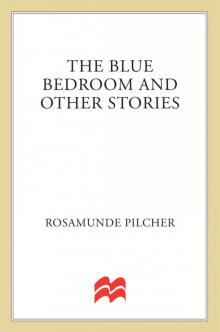 The Blue Bedroom: & Other Stories
The Blue Bedroom: & Other Stories The Carousel
The Carousel The End of Summer
The End of Summer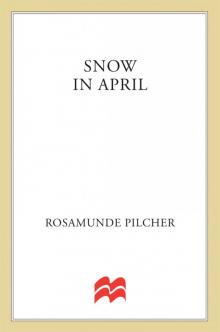 Snow in April
Snow in April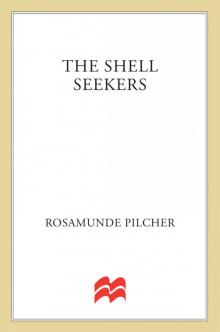 The Shell Seekers
The Shell Seekers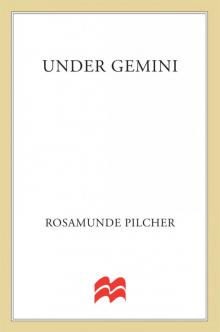 Under Gemini
Under Gemini The Empty House
The Empty House The Day of the Storm
The Day of the Storm Another View
Another View Voices in the Summer
Voices in the Summer The World of Rosamunde Pilcher
The World of Rosamunde Pilcher Voices In Summer
Voices In Summer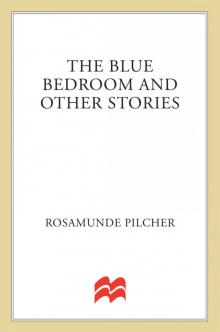 Blue Bedroom and Other Stories
Blue Bedroom and Other Stories